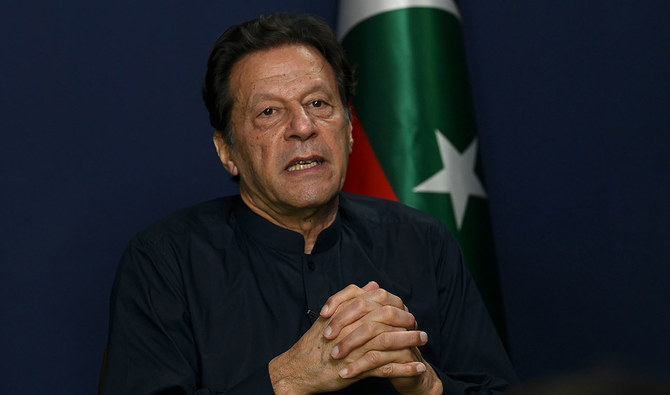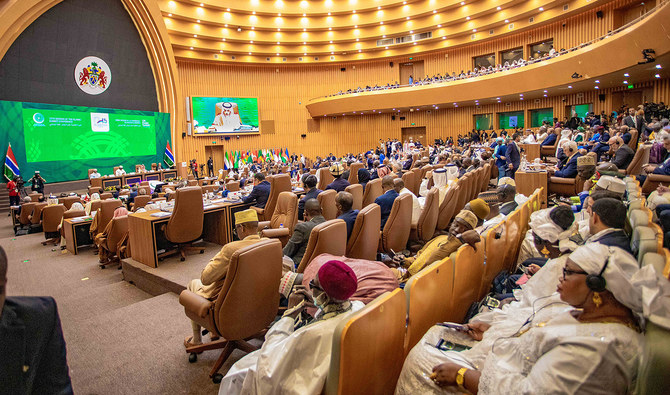ISLAMABAD: Despite facing numerous defections within his camp, escalating tensions with Pakistan’s powerful military establishment, and mounting legal challenges, former prime minister Imran Khan remains a resilient political figure, according to leading political analysts.
Since his ouster from office in April 2022 via a parliamentary no-confidence vote, Khan has been embroiled in confrontations with the military, accusing the country’s former army chief, General (retired) Qamar Javed Bajwa, of conspiring against him and blaming a senior intelligence official for an apparent bid on his life last November.
The military has denied all these allegations.
Khan’s tensions with the army reached a boiling point on May 9 when his party supporters attacked government buildings and key military installations following his brief arrest on graft charges from an Islamabad court. The former premier has also been facing a litany of cases against him since his ouster from power, with charges ranging from corruption to sedition and terrorism.
Khan’s key aide and former defense minister, Pervez Khattak, has parted ways with him and formed a breakaway faction of Khan’s Pakistan Tehreek-e-Insaf (PTI) party. Another estranged PTI leader and former Khan confidant, Jahangir Khan Tarin, has established the Istehkam-e-Pakistan Party to counter his old boss and advance his own political interests.
“I wouldn’t say he is politically obscure; he is very much a strong political figure in the country,” journalist and author Zahid Hussain told Arab News, adding that Khan’s support base had increased over the last 15 months.
“Nawaz Sharif [of the ruling PML-N party] was also ousted, but he came back both times,” he added. “Khan also cannot be written off.”
Falling out of favor with Pakistan’s powerful military — which has held sway over the country’s political affairs in the past seven decades — forced former prime ministers Benazir Bhutto and Nawaz Sharif to leave the country and live in self-imposed exile for significantly long periods. However, they both managed to stage political comebacks years later and were re-elected prime ministers.
Dr. Rasul Bakhsh Rais, professor of Political Science at the Lahore University of Management Sciences (LUMS), agreed that Khan’s political base would remain intact come election time, adding that the breakaway factions led by Tarin and Khattak would not do much damage to the cricketer-turned-politician.
“I don’t think they will be able to pull the popular constituencies away from Imran Khan’s reach,” Rais told Arab News. “They will gather a good group of electables and their personal constituencies, but I think on the ground, the support that Imran Khan enjoys will remain with him.”
“I don’t think the politically and ideologically committed worker of the PTI would go with them (the PTI breakaway factions),” he added.
Rais said the former premier’s political future largely depended on how long the country’s military wanted to keep him out of power, adding that “they do have the power to keep the courts and other state institutions dysfunctional.”
“But it will [also] depend on an open, competitive, constitutional, and democratic system,” he said. “Whenever we have that – and I don’t think we have a possibility of this happening in the coming years – but whenever we have it, Imran Khan will have his opportunity.”
Rais said it also depended on how Khan played his cards and restored his relationship with the military.
Pakistani journalist Arifa Noor said how well Khan’s party does in the next elections would depend on the environment in which they were held.
“It all depends on the environment that prevails at the time,” she told Arab News. “It would depend on multiple factors, such as how aggressively the party resists, or whether its candidates are allowed to contest elections and if they would be allowed to run election campaigns or not.”
Noor said Khan’s narrative was resonating with the masses because of Pakistan’s dismal economic situation, adding that the fact that most of Pakistan’s political parties were in power during such inflationary times was a political advantage for him.
















